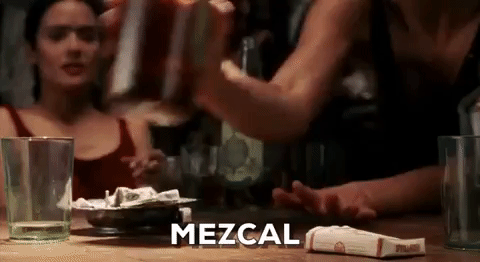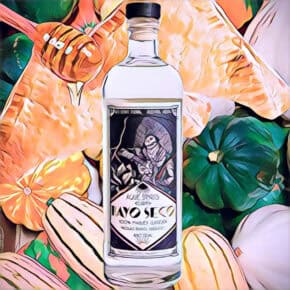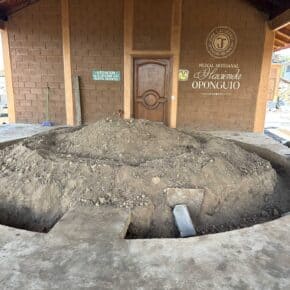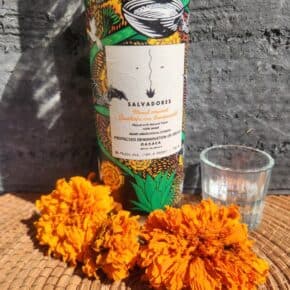
What is a mezcal? Who can label their bottles with the word “mezcal”? Those are the existential questions that bedevil this industry. For a second there we thought that they were more or less settled, even if you didn’t like the result, with NOM 70 this past spring. But now a new struggle has emerged between one faction that argues that the term should be applied to those who have a claim to tradition. But the profound irony of their stance is that “mezcal,” per the new NOM definition, now means less ‘traditional product’ than ‘anything goes.’
A bit of background
This definitional question has been continuously asked ever since mezcal got its appellation in 1995. It’s taken on greater urgency in recent years after the growth in the mezcal industry proved that there really was a strong business in mezcal. The growth has been amazing even if if from a small base and still minuscule when compared to tequila or most other spirits. But the money and everything else involved, cultural legitimacy, pride, and all the other supposed intangibles that seldom get mentioned in these conversations mean that the tangled web of who gets to call their agave distillates “mezcal” instead of “distilled agave spirits” or something similar is becoming a huge issue.
The latest spark was a proposal to expand the appellation of mezcal. Right this second there are nine Mexican states in the appellation (Oaxaca, Durango, Guanajuato, Guerrero, San Luis Potosí, Tamaulipas, Zacatecas, Michoacán, and Puebla) but a Mexican government intellectual property department just proposed that three others be added: Aguascalientes, Estado de Mexico, and Morelia. The appellation used to be very small but has rapidly expanded in recent years as more mezcal makers across Mexico have clamored to have their products included. It’s important to them financially because they can market their spirits as “mezcal,” but also a point of pride because they’re making something uniquely Mexican and receiving recognition from the government has been an important point.
The three additional states weren’t anything absolutely shocking. It had been long assumed that Estado de Mexico would be one of the next states on the list if only because of various political pressures. But the addition of Aguascalientes raised a few eyebrows because it’s generally not in the conversation about traditional mezcal producers. Clearly, there are lots of agave raised in Aguascalientes. And just as clearly, lots of mezcal has been made there. But the discussion about these things has always ranged widely and the thinking about traditions rarely makes a clean transition into the legal world. It feels like the government is trying to encourage the growth of mezcal production in Mexico to make it into a large and strong industry. If you take that perspective, then clearly expanding the appellation makes sense because you can quickly ship more product labeled “mezcal” to the world.
Commodity or tradition?
The fact that this follows the tequila model of growth over product identity means that someone hasn’t been studying the existential issue of commodification in the tequila industry. The fact that this comes on the heels of a new naming convention for mezcal also means that the mezcal world hasn’t addressed its own identity conflict: The people arguing against expanding the mezcal appellation focus on a historic tradition as the key factor in whether a state should be added to an appellation. That idea is the core of the entire appellation idea which is basically to define a tradition legally. The idea is that a traditional product like mezcal will survive global capitalism and that the producers will gain profound equity from their work. This system has worked fantastically well for some groups like European cheese and wine producers, so well that the European Union funds this process for myriad agricultural products including something as strange and wonderful as mastic gum produced by a single island in the Mediterranean.
The key to all of this is specificity because you have to define the identity of something in order to give it additional value. The average bottle of champagne is 40% more expensive than the average bottle of sparkling wine because the producers have managed to create a perception of value that most consumers seem to accept. But there’s a tremendous degree of consensus about Champagne while the mezcal world is wracked by fundamental divisions.
A mixed up world
Thus, we find ourself in the current situation where the CRM, some producers, and the current governor of the State of Oaxaca say that they want the mezcal appellation to be based on tradition. But the law that defines mezcal clearly started as a carbon copy of the tequila appellation. It has modified itself as circumstances dictate, most notably with NOM 70, the latest law that puts mezcal into three categories. The first and smallest is for “Ancestral” mezcal which is really hand made with clay pot stills which reflects a very old tradition still practiced in a few places like Santa Catarina Minas. The second is called “Artesenal.” Most mezcals that hew to traditional production practices can use this one. But the real kicker is the third category called “Mezcal.” Yes, just one word, “Mezcal” which means distilled agave from the approved states using any variety of industrial methods.
So, the latest law defining mezcal uses the term “Mezcal” to mean industrially produced mezcal. And this for a spirit that lives and breathes off the marketing image of being hand made. Many people see this as progress which speaks to the variety of conflicts leading up to this moment. But the fact that we’re still in the midst of a really basic argument about what constitutes a mezcal means that we’re back to square one. It’s an opportunity to start over and correct many of the problems with the mezcal DO but also a moment fraught with danger.












The word should belong to the world. Save certification for regionality. Oaxacan Mezcal? Sure. Minero? Sure. Ixcateco? Sure. But mezcal — that should be a category, not an expression.
Sorry, I should have posted a link to your blog post on this topic from early 2017. Here it is! https://mezcalistas.com/no-mezcal-gracias-por-favor-destilado-de-agave/